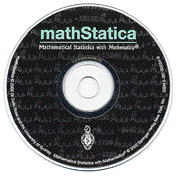|
|||
Features include:
Advanced user interfacemathStatica makes full use of the latest interface technologies. Palettes provide easy access to the most common distributions (Gold version). On-line HELP is a click away. And, mathStatica is perfectly integrated with the Springer text Mathematical Statistics with Mathematica, so that every example is live, every equation is at the reader's finger tips, every diagram can be generated on the fly, equations are hyperlinked, footnotes pop-up, cross-references are live, the index is hyperlinked and animations are a mouse-click away. Delightfully SimpleBy delightfully simple, we mean both (i) easy to use, and (ii) able to solve problems that seem difficult, but which are formally quite simple. Consider, for instance, playing a devilish game of chess against a strong chess computer: in the middle of the game, after a short pause, the computer announces, "Mate in 16 moves". The problem it has solved might seem fantastically difficult, but it is really just a 'delightfully simple' finite problem that is conceptually no different than looking just two moves ahead. The salient point is that as soon as one has a tool for solving such problems, the notion of what is difficult changes completely. A pocket calculator is certainly a delightfully simple device: it is easy to use, and it can solve tricky problems that were previously thought to be difficult. But today, few people bother to ponder at the marvel of a calculator any more, and we now generally spend our time either using such tools or trying to solve higher-order conceptual problems - and so, we are certain, it will be with mathematical statistics too.
|
Bestellen/Preise:
|
||
 mathStatica
mathStatica